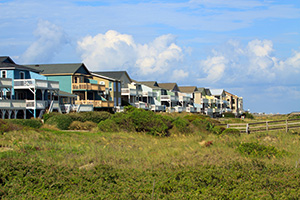Rental Property Investment
 Rental real estate can be a good option for some people. There are several advantages of owning a rental property. Tenants pay you rental income. Your property can appreciate due to market conditions and/or sweat equity (home improvements). It can provide you with sizeable tax benefits (deduction of operating costs, depreciation, etc.). Rental property can also help diversify your overall portfolio. Finally, it can act as an inflation hedge as rent will typically increase along the lines of inflation.
Rental real estate can be a good option for some people. There are several advantages of owning a rental property. Tenants pay you rental income. Your property can appreciate due to market conditions and/or sweat equity (home improvements). It can provide you with sizeable tax benefits (deduction of operating costs, depreciation, etc.). Rental property can also help diversify your overall portfolio. Finally, it can act as an inflation hedge as rent will typically increase along the lines of inflation.
For people thinking about owning rental property, here are some things to consider:
Assuming you have the risk tolerance and capacity (assets and income) for a rental property investment in retirement, here are some of your options:
Keep existing property: You may already own a rental property and you’re wondering whether to keep it. As noted above, if you have other assets and income sources, it’s probably providing a decent amount of diversification. If you have good cash flow, no major maintenance issues, and you expect further appreciation, then it’s probably a solid investment. However, if things aren’t going well, it may be time to consider disposing of the property.
Buy vacation rental: A benefit of a vacation rental is that you can use the place yourself. Thus, this investment is often looked at through dual lenses. It’s a rental which provides income and hopefully appreciation, and it’s also a free place to stay, cutting down on vacation expenses. Location, location, location is very important for a vacation rental as most people prefer to be right by the beach, slopes, or other area attraction. That means the property will be more expensive and have higher ongoing costs (if financed), or take up more of your assets. Income can fluctuate wildly throughout the year as there’s likely a high season and a low season. If you have a mortgage and other costs (HOA, etc.), you’ll definitely need a source of funds to pay the expenses during the off season. Vacation rentals may also have more upkeep associated with them because of the turnover of renters and their location (sand, salty air, snow, etc.). If you’re only looking at it as an income investment, you’d probably be better off with a traditional rental property, since they tend to have a steadier cash flow. However, if you think you’d vacation a lot in the rental yourself and you don’t mind strangers staying in your place, then a vacation rental could be a decent option.
Quarter / Fractional ownership: Typically you would find fractional ownership associated with vacation properties, so the issues surrounding them are similar. You will probably have less risk, but also less return. It could be less risky because your investment isn’t as big (as if you bought the whole property), and you have other owners to split major expenses with. However, you should also expect less return because you have to split rental income amongst the owners and these properties are typically bought at a considerable premium, so you might not get the appreciation of a regular vacation rental.

